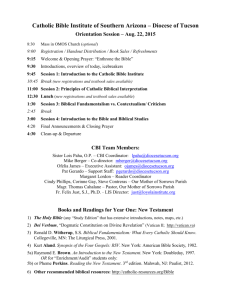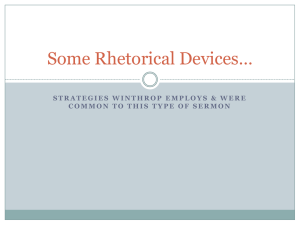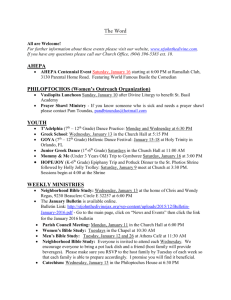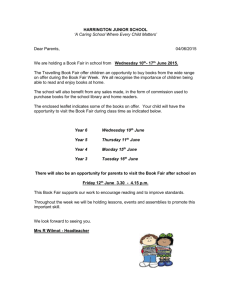Foundations of Biblical Study
advertisement
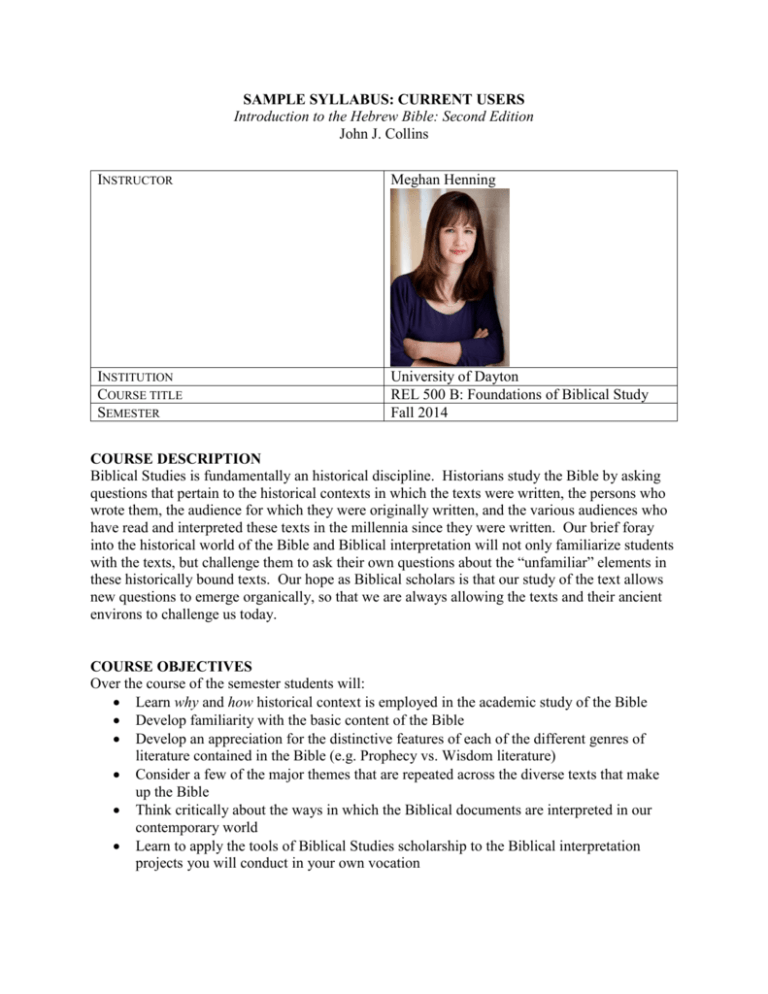
SAMPLE SYLLABUS: CURRENT USERS Introduction to the Hebrew Bible: Second Edition John J. Collins INSTRUCTOR Meghan Henning INSTITUTION COURSE TITLE SEMESTER University of Dayton REL 500 B: Foundations of Biblical Study Fall 2014 COURSE DESCRIPTION Biblical Studies is fundamentally an historical discipline. Historians study the Bible by asking questions that pertain to the historical contexts in which the texts were written, the persons who wrote them, the audience for which they were originally written, and the various audiences who have read and interpreted these texts in the millennia since they were written. Our brief foray into the historical world of the Bible and Biblical interpretation will not only familiarize students with the texts, but challenge them to ask their own questions about the “unfamiliar” elements in these historically bound texts. Our hope as Biblical scholars is that our study of the text allows new questions to emerge organically, so that we are always allowing the texts and their ancient environs to challenge us today. COURSE OBJECTIVES Over the course of the semester students will: Learn why and how historical context is employed in the academic study of the Bible Develop familiarity with the basic content of the Bible Develop an appreciation for the distinctive features of each of the different genres of literature contained in the Bible (e.g. Prophecy vs. Wisdom literature) Consider a few of the major themes that are repeated across the diverse texts that make up the Bible Think critically about the ways in which the Biblical documents are interpreted in our contemporary world Learn to apply the tools of Biblical Studies scholarship to the Biblical interpretation projects you will conduct in your own vocation REQUIRED TEXTS The Bible (New Revised Standard Version [NRSV], with Apocrypha). I recommend the Harper-Collins Study Bible, but any edition of the NRSV is fine. Collins, John J. Introduction to the Hebrew Bible. Second Edition. Minneapolis: Fortress, 2014. (Abbreviated as Collins) Ehrman, Bart D. The New Testament: A Historical Introduction to the Early Christian Writings. Fifth Edition. New York: Oxford University Press, 2012. (Abbreviated as: Ehrman) SCHEDULE OF CLASSES AND ASSIGNMENTS Date Wednesday, August, 27 Class Description Introduction Reading Assignments Read Collins, 1-23 What do you want to know about the Bible that you don't already know? How will you use the Bible in your vocation? Read Michael Joseph Brown What They Don't Tell You: A What is the Scholarly Study of the Bible? Wednesday, September 3 Wednesday, September 10 Wednesday, September 17 Wednesday, September 24 Wednesday, October 1 Pentateuch: Beginnings Pentateuch: Covenant and Law Survivor's Guide to Biblical Studies 1-40. (On Isidore) Skim Brown, 41-108 (On Isidore) and come to class prepared to discuss in detail at least three "rules of thumb" that you found changed the way you think about studying the Bible. Collins, 27-107 Collins, 109-182 Becoming a Nation: Monarchy and Divided Collins, 185-296 Kingdom In Class Interpretation Workshop: Choosing a Project/Topic for Biblical Interpretation Project Prophets: Impact of the Exile Collins, 349-394 Return from the Exile Interpretation Project Topics Due Collins, 395-416; 449-465 In Class Interpretation Workshop: Using Lexical Aids and Commentaries Wednesday, October 8 Wednesday, October 15 Wednesday, October 22 Wednesday, October 29 Writings: Responses to Outside Pressure Collins, 547-592 MIDTERM EXAM, Introduction to the New Testament Synoptic Gospels: Mark Ehrman, 29-80 In Class Interpretation Workshop: Developing a Bibliography in Biblical Studies Research Synoptic Gospels: Matthew and Luke-Acts Wednesday, November 5 The Gospel of John and the Historical Jesus Wednesday, November 12 Wednesday, November 19 Wednesday, November 26 In Class Interpretation Workshop: Using Secondary Sources for Biblical Studies Research Paul: Theologian and Community Organizer Deutero-Pauline Epistles and Women in Early Christianity NO CLASS (Dr. Henning at SBL Conference) Wednesday, December 3 Wednesday, December 10 Ehrman, 82-112; 275-293 Ehrman, 114-174; 253-258 Bibliography Due for Biblical Interpretation Project Ehrman, 176-197; 237-251 Ehrman, 306-384 Ehrman, 397-433 Hebrews, 1Peter and James Ehrman, 435-488 Revelation Biblical Interpretation Projects Due (Submit on Isidore) Ehrman, 490-506 (Confirmation Page of Course Evaluation for 1 pt. Bonus) Wednesday, December 17 Final Exam, 4:30-6:20PM
